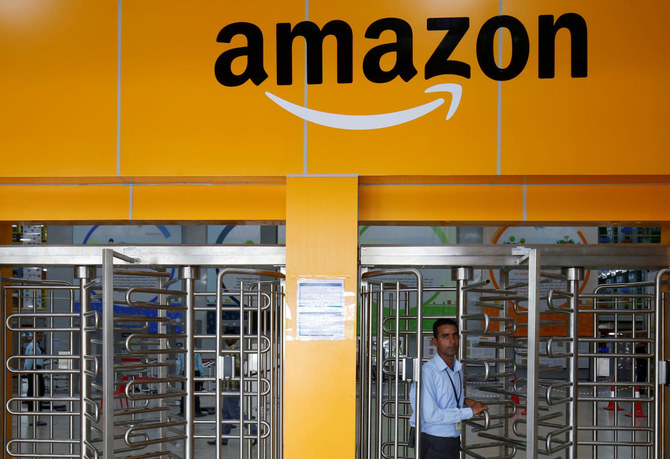MUMBAI: The Indian government has warned Amazon.com’s local unit and Walmart’s Flipkart that sellers on their platforms are not complying with a rule requiring that a product’s country of origin be specified.
A push for strict enforcement of the rule has come amid tensions between India and China following a border skirmish which began in June, and is part of India’s efforts to cut down on Chinese-made imports.
The two e-commerce firms have been given 15 days to explain the lapses or action will be taken against them, according to an Oct. 16 letter addressed to the companies from the Ministry of Consumer Affairs and seen by Reuters.
It did not specify what action may be taken, referring only to a legal act that has provisions for fines.
Representatives for Amazon and Flipkart did not immediately respond to Reuters requests seeking comment outside regular business hours.
In addition to enforcing the country of origin rule, New Delhi has also banned 177 Chinese mobile applications since June while Chinese goods in ports have faced extra scrutiny and delays.
Amazon has often faced regulatory challenges in India. Last year, the government enforced strict rules for foreign investment in e-commerce which forced the US retail giant to rework its business structures and strained ties between New Delhi and Washington.
In January, the Competition Commission of India ordered an investigation into Amazon and Flipkart over alleged violations of competition law and certain discounting practices, which Amazon is challenging, according to court filings.
India warns Amazon, Flipkart over country of origin rule amid tensions with China
https://arab.news/yx6gt
India warns Amazon, Flipkart over country of origin rule amid tensions with China

- A push for strict enforcement of the rule has come amid tensions between India and China
- New Delhi has banned 177 Chinese mobile applications since June
ACWA Power’s Shuaa Energy 3 granted commercial operation certificate for 300MW solar project

RIYADH: The third stage of a Dubai-based 900-megawatt solar project being developed by Shuaa Energy 3 is ready to begin commercial operations, it has been announced.
Saudi energy firm Acwa Power – which owns a 24 percent stake in the company behind the facility – revealed in a Tadawul filing that the Project Commercial Operation Certificate of Phase C of the project has been granted.
PCOC is a document confirming that the facility at Mohammed bin Rashid Al Maktoum solar park is fully completed and ready for commercial operation.
Phase C, encompassing an additional 300MW, contributed to the complete plant achieving commercial operation with a total capacity of 900MW.
The plant utilizes bifacial photovoltaic technologies, which harness reflected solar rays on both the front and back sides, in conjunction with a single-axis tracking system, to enhance energy production.
Shuaa Energy 3 is the special purpose vehicle established to develop the fifth phase of the solar park, and is also owned by the Dubai Electricity and Water Authority and Gulf Investment Corporation.
Together with Acwa Power, they have entered into a 25-year power purchase agreement to generate clean energy, aligning with Dubai Clean Energy Strategy 2050.
Egypt’s exports to Arab counties up 8.7% in 2023, Saudi Arabia tops list

RIYADH: The value of Egyptian exports to Arab countries surged 8.7 percent year on year to reach $13.6 billion in 2023, according to new data.
A statement from Egypt’s Central Agency for Public Mobilization and Statistics revealed that Saudi Arabia topped the list of the highest Arab countries importing from nation during the year, with the value of the African country’s exports amounting to $2.7 billion in 2023.
This falls in line with the significant growth in trade relations, partnerships, joint projects, and development investment between the two countries in recent years.
The statement revealed that the Kingdom was followed by the UAE, with Egyptian exports reaching $2.2 billion, followed by Libya with about $1.8 billion, Sudan with an estimated $984.4 million, and Algeria at $850.3 million.
Regarding the top commodity groups exported to Arab countries during 2023, the agency indicated that vegetables and fruits were exported with a value of $1.3 billion, followed by machinery and electrical appliances with a worth of $1.1 billion.
Furthermore, Egypt’s exports of pearls, precious stones and jewelry to the Arab countries came next, amounting to $1 billion, while exports of fuel, mineral oils and distillation products stood at $753 million.
Meanwhile, the country’s exports of plastics and manufactures totaled $712 million.
Saudi Arabia’s holdings in US treasuries rise to $135.9bn

RIYADH: Saudi Arabia’s holdings in US treasuries increased for the eighth consecutive month in March, reaching $135.9 billion, a rise of 3.66 percent compared to the previous month.
According to official data released by Washington, the Kingdom was ranked 17th among the largest investors in such financial instruments in March.
The report noted that Saudi Arabia’s holdings of US Treasuries were distributed among long-term bonds worth $107.3 billion, representing 79 percent of the total.
On the other hand, the Kingdom’s short-term bonds were worth $28.6 billion in March, accounting for 21 percent of the total value.
In February, the Kingdom’s holdings in US treasuries stood at $131.1 billion, compared to $133.5 billion in January and $132 billion in and December,
The data suggested that Japan was the largest investor in US treasury bonds in March, with holdings totaling $1.18 trillion, representing a rise of 1.16 percent from February.
China and the UK followed, with portfolios valued at $767.4 billion and $728.1 billion, respectively.
Luxembourg and Canada were ranked in the fourth and fifth spots, with treasury holdings amounting to $399.3 billion and $359.1 billion, respectively.
Ireland secured the sixth rank in the list with holdings of $317.8 billion, closely followed by Belgium with portfolios worth $317.1 billion.
The Cayman Islands came in the eighth position with treasury reserves worth $302.9 billion, followed by France and Switzerland, with assets amounting to $283.1 billion and $262.9 billion, respectively.
Taiwan was ranked eleventh on the list, with treasury holdings worth $259 billion.
India came in the twelfth spot with assets amounting to $240.6 billion, followed by Brazil and Singapore, which had holdings worth $227.1 billion and $208 billion, respectively.
Earlier this month, a report released by the Saudi Central Bank, also known as SAMA, revealed that international reserve assets declined by 2 percent in April to SR1.66 trillion ($440 billion) compared to the previous month.
However, the Kingdom’s foreign reserve assets jumped 3 percent in April compared to the same period of the previous year.
Fintech firm Hala gets SAMA approval to offer debt-based crowdfunding solutions

RIYADH: Saudi businesses are set to gain access to new crowdfunding solutions as Hala Payments Co. has received licensing approval from the Kingdom’s central bank to offer debt-based products.
The Saudi-based fintech platform offers inbound and outbound payment options to small and medium enterprises, with over 50,000 merchants currently using its services, according to its website.
With this approval, the total number of companies licensed to engage in this activity in the Kingdom has reached 11, while authorized finance companies now stands at 62, stated the Saudi Central Bank in a press release.
Debt-based crowdfunding provides a pathway for projects or businesses in need of funding. Instead of relying on a single lender, borrowers secure loans from multiple investors.
This model is particularly advantageous for small businesses or individuals who may face challenges obtaining loans from traditional banks. Essentially, it serves as a dual opportunity: borrowers receive the necessary funding, while investors earn returns by directly lending money.
In January, SAMA issued a license to Thara, a debt crowdfunding platform, to operate in the Kingdom. The fintech firm specializes in financing real estate development projects, connecting individual and institutional investors with investment opportunities through Murabaha products.
This decision to issue licenses falls within the framework of the central bank’s efforts to support and empower the finance sector, aimed at enhancing the effectiveness and flexibility of transactions, added SAMA.
It also seeks to foster innovation and promote it, with the objective of enhancing the level of financial inclusion in the Kingdom and extending such services to all segments of society.
SAMA emphasized the importance of dealing with licensed or authorized financial institutions, which can be verified by visiting its official website.
The central bank warned that it may take any necessary actions, such as conducting on-site visits, meeting with the company’s executives, and reviewing its regulations, procedures, and records, to verify that the debt-based crowdfunding company has met all its requirements.
It added that the license can be canceled if the firm requests cancellation, provides false information, violates rules or laws, delays starting activities for six months, or suspends operations for over three months without SAMA’s approval.
Mawani issues new licenses to strengthen ports sector in Saudi Arabia

RIYADH: The Kingdom’s seaport activities and logistics sector are set to improve, with the Saudi Ports Authority issuing new licenses in multiple areas of operation.
In a press statement, the authority, also known as Mawani, said that issuing these permits aligns with its goal of developing port business in the Kingdom with high efficiency and quality.
Mawani revealed that permits have been issued in various areas of operations, including pilotage, maritime support, marine traffic signals, and ship repair and routine maintenance.
The statement added that licenses were also issued for container handling and port storage services, and maritime consultancy activities.
The issuance of these new permits is part of Mawani’s broader strategy to position Saudi Arabia as a global logistics hub by the end of this decade.
Saudi Arabia’s National Transport and Logistics Strategy seeks to increase the sector’s contribution to the Kingdom’s gross domestic product to 10 percent from the current 6 percent by 2030.
In the statement, Mawani further revealed that additional licenses were given to activities like bunkering ships in terminals, waste recycling and ship waste management, as well as, hydrographic surveying, and port work training.
In January, the authority announced that it established new ship anchorage areas in the Kingdom’s King Fahd Industrial Port in Yanbu.
According to a statement, newly established docking zones will help modernize several port logistical services, including delivering ships with supplies and fuels, said Mawani in a statement.
The body also noted that these new anchorage zones will increase the terminal’s operational performance indicators and reduce ship docking times.
In December 2023, Mawani garnered 79.01 points in the UN Conference on Trade and Development’s Liner Shipping Connectivity Index for the fourth quarter of 2023, compared to 77.66 points issued in the previous three months.
Moreover, Saudi Arabia also progressed in container handling, moving from 24th to 16th in the Lloyd’s List One Hundred Ports rankings.
Similarly, the Kingdom climbed 17 places in the World Bank’s Logistics Performance Index, securing the 38th position out of 160 countries.

















